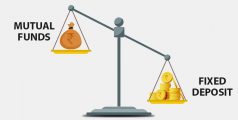
The Smart Way to Save: Fixed Deposits
Posted on Saturday, July 11th, 2020 | By IndusInd Bank
Whether you are a salaried professional or self-employed, saving money is crucial for building a financial safety net. While there are several financial instruments available for the purpose – mutual funds, equity, etc. – they typically present high-risk options. Fixed deposits are one of the safest investment avenues with fixed yet guaranteed returns. Here are some reasons why investing in fixed deposits is a smart and financially savvy decision.
Inculcate Discipline
To achieve your long-term financial goals, it is important to plan and organize finances well ahead of time. Saving money in a fixed deposit requires you to be disciplined since you must invest your corpus in one go, for a specific period of time. This means your money is not available to you for spending, but is instead kept safe and earns interest. If you wish to withdraw your funds before maturity, your bank will charge a premature withdrawal penalty. This ensures you don’t exhaust your savings, unless it’s an emergency.
Flexible Tenure
Most banks offer a flexible investment tenure for fixed deposits, making them an ideal option for meeting short-term, medium-term and even long-term financial goals. Fixed deposit interest rates, however, vary with the investment tenure you choose. At IndusInd Bank, you enjoy a flexible range of tenures to suit your investment plans with competitive fixed deposit interest rates.
Liquidity
While a fixed deposit may not allow you to withdraw money without charging a penalty for premature withdrawal, it still presents a smart investment option. If you ever face an emergency, you can withdraw your savings by paying a small premature withdrawal fee. At IndusInd Bank, we permit partial withdrawals on your fixed deposit.
Tax Benefits
You may choose a tax-saving fixed deposit to enjoy tax benefits. As per Section 80C of the Income Tax Act, deposits with an investment tenure of 5 years fall under the tax exempt category. Even though the interest that you earn will be taxable, you can claim a deduction of up to Rs 1.5 lakhs in a financial year. Moreover, the principal amount you invest is exempted from taxation.
Power of Compounding
The earlier you start saving in a fixed deposit, the sooner can you grow your wealth with the power of compounding. Even a small amount can quickly multiply with compounding. When you choose a deposit, you can select the frequency for receiving the interest – monthly, quarterly, half-yearly, annually, or all at once at maturity. Moreover, you have the option of re-investing your earned interest and supplementing your savings. This means that compounding helps you to not just earn interest on the principal amount, but also on the interest you earn.
Guaranteed Returns
One of the biggest benefits of investing in fixed deposits is the guaranteed returns. If you remain invested for a fixed duration, you are sure to earn the interest promised by your bank, irrespective of the fluctuating market conditions. These returns are fixed before you even make the investment, regardless of the amount you invest.
Fixed deposits, regardless of market fluctuations, guarantee returns. You can enjoy the benefits of a flexible range of tenures to suit your investment needs. Hence, fixed deposits are the perfect option for your short-term and long-term needs. So wait no more and open an online fixed deposit at IndusInd Bank today!
Disclaimer: The information provided in this article is generic in nature and for informational purposes only. It is not a substitute for specific advice in your own circumstances. Hence, you are advised to consult your financial advisor before making any financial decision. IndusInd Bank Limited (IBL) does not influence the views of the author in any way. IBL and the author shall not be responsible for any direct/indirect loss or liability incurred by the reader for taking any financial decisions based on the contents and information.



 Offers
Offers Rates
Rates Debit Card Related
Debit Card Related Credit Card Related
Credit Card Related Manage Mandate(s)
Manage Mandate(s) Get Mini Statement
Get Mini Statement
 categories
categories Bloggers
Bloggers Blog collection
Blog collection Press Release
Press Release


